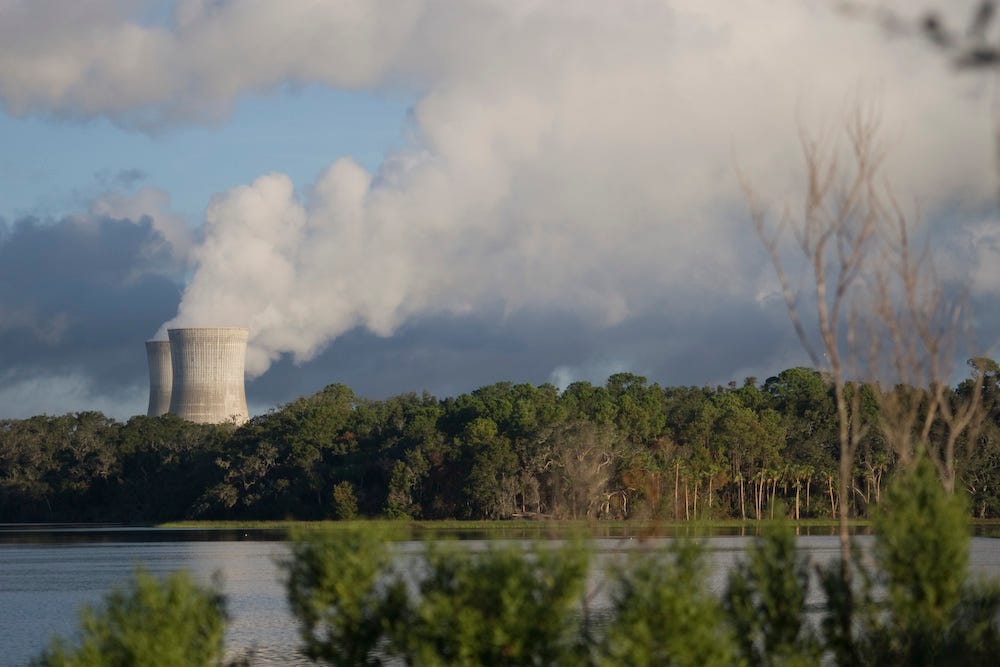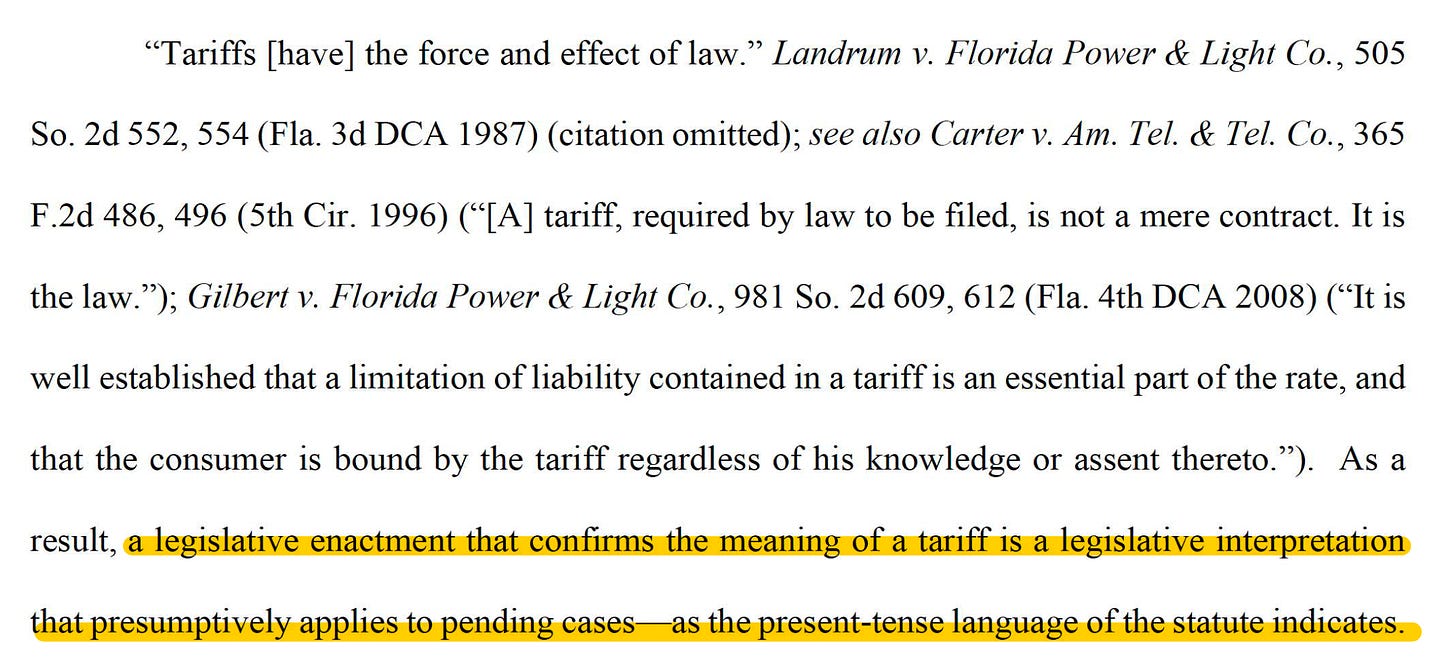Customers took Florida's biggest power company to court. Ron DeSantis and lawmakers stepped up to help...the power company.
Florida's elected leaders keep racing to the defense of big businesses that run into legal trouble.

This is Seeking Rents, a newsletter and podcast devoted to producing original journalism — and lifting up the journalism of others — that examines the many ways that businesses influence public policy across Florida, written by Jason Garcia. Seeking Rents is free to all. But please consider a voluntary paid subscription, if you can, to help support our work.
This spring, just a few months after Hurricanes Ian and Nicole flooded Florida, state lawmakers made a bunch of changes meant to help communities recover more quickly from natural disasters — from speeding up the removal of storm debris to slashing red tape for rebuilding homes and businesses.
But tucked inside that natural disaster package was a favor for Florida’s big power companies: A new law shielding them from lawsuits brought by customers who suffer losses during post-storm power outages.
The provision — which was added to the bill late in the session and with little opportunity for any public input — was sponsored by Rep. Mike Giallombardo, a Republican from southwest Florida. And it surfaced in the state Capitol just a few weeks after Florida’s largest electric utility lost a key round in a class-action lawsuit brought by customers who lost power after Hurricane Irma struck the state in September 2017.
The company — Florida Power & Light — is now trying to use the new law to convince a judge to toss the lawsuit, which claims that FPL failed to adequately prepare for Irma and seeks to make the company cover the cost of spoiled food, lost income, and other injuries and expenses.
And newly filed campaign-finance records show that FPL’s parent company recently gave $10,000 to Giallombardo.
FPL is owned by NextEra Energy Inc., which turned a $3.2 billion profit last year.
Attorneys for the customers suing FPL accuse the company of using Florida politicians to avoid responsibility for its mistakes — both the mistakes it made ahead of Irma and mistakes it might make during any future storms.
“FPL convinced the Florida Legislature to ignore its past failures to adequately prepare for storms and hold it harmless from all business risk with hurricanes,” Alexis Fernandez, a Miami attorney who is one of the lead lawyers on the suit, said in a written statement. “It sets a dangerous precedent that undermines the fundamental principle of rule of law.”
Rushing in to rescue big businesses
This isn’t the first time elected leaders in Tallahassee have rushed in to help a big business that has run into legal trouble.
For example, Gov. Ron DeSantis signed the bill containing FPL’s lawsuit immunity (Senate Bill 250) on June 28. That very same day, the governor also signed another piece of legislation arising out of a dispute involving Mattamy Homes, one of the largest homebuilders in North America.
That bill (Senate Bill 718) deals with situations where a real-estate developer has persuaded a local city or town to annex their land so they can develop it at more intense uses. The legislation would, among other things, make it easier for the developer to block any subsequent efforts by local residents to make the city or town reverse course and de-annex the land before it becomes covered in rooftops.
The legislation was supported in public by the Florida Home Builders Association. But records obtained by the Florida Center for Government Accountability show that key parts of it were written in private an executive at Mattamy — which is in the midst of a de-annexation fight in Sarasota County.
Mattamy is developing a roughly 5,000-acre subdivision on land that was originally annexed by the small city of North Port. But a group of residents, apparently unhappy with North Port’s services, have been trying to get the area de-annexed from the city.
Meanwhile, in 2021, Florida’s Republican-controlled Legislature passed — and DeSantis signed — a bill protecting the state’s sugar industry from lawsuits over the public health impacts of pre-harvest burning, in which the companies set fires in their fields to burn away the outer leaves on sugarcane and make it easier to harvest the stalks.
That legislation (Senate Bill 88) was filed in Tallahassee after Florida Crystals, U.S. Sugar and other sugar growers were hit with a potential class-action lawsuit alleging that toxic soot from those fires — which locals call “black snow” — causes health problems and property damage.
The lawmakers pushing the bill insisted at the time that the legislation had nothing to do with the sugar industry. But emails obtained in public-records requests showed that legislative staffers were keeping close tabs on the litigation and studying pleadings in the case as they worked on the bill. And the judge in that case later wrote that “it is clear” Florida leaders intended to block these kind of lawsuits.
Changing the rules in the middle of the game
But what makes FPL’s legislation more unusual is that the company is now trying to use it retroactively — to shoot down a lawsuit that was filed in 2017, years before DeSantis and the Legislature decided to step in and rewrite the law.
The new law does two main things.
First, it says that any disputes over whether a power company failed to adequately prepare for or respond to a hurricane — for instance, by failing to replace decaying utility poles or remove tree limbs hanging over power lines — must be resolved by the state’s Public Service Commission, rather than by a court.
And second, it gives FPL and other power companies — including Duke Energy and Tampa Electric Co. — total immunity against any monetary claims stemming from a power outage following a hurricane or other disaster.
FPL’s attorneys claim that both those changes should apply to the Hurricane Irma lawsuit. In a motion to dismiss filed last week, the company makes a couple of arguments.
It claims, for instance, that the part of the new law giving jurisdiction to the PSC is merely a procedural change that doesn’t affect any customer’s underlying rights. (But ask yourself whether you’d prefer to have a case against FPL tried in a courtroom — or before a DeSantis-appointed PSC that is so notoriously cozy with the utility industry that watchdogs have deemed it a “captured agency.”)
At the same time, FPL claims that the other part of the new law — the part that gives power companies immunity from monetary damages — isn’t really a new law at all. That’s just a clarification of existing law, the company says.
FPL’s filing also suggests that company lobbyists worked very closely with state lawmakers on the legislation.
For example, when lawmakers want a new law to apply retroactively, they will often include a line in the bill that explicitly says so. But that’s also a bright red flag that can attract unwanted scrutiny and controversy during legislative hearings.
There’s no such provision in FPL’s legislation. But the bill is written in the present tense. Specifically, the bill says that an electric company “is not liable” for any post-storm power outages — instead of using a future-oriented phrase, like “shall not be liable.”
FPL’s lawyers seized on that subtlety in their legal brief. “…The present-tense language of the statute indicates” that the Legislature intended new law to apply to active lawsuits, they wrote.
By contrast, SB 718 includes a line making clear that the changes are prospective only, so it appears unlikely that bill will disrupt Mattamy Homes’ de-annexation dispute. And while the class-action lawsuit against the sugar industry was withdrawn not long after DeSantis signed SB 88 into law, the judge in the case wrote in a ruling that the new law would only have applied to future claims.
FPL has friends in both political parties
Ultimately, it will be up to the judge presiding over the Hurricane Irma lawsuit to decide whether FPL’s new legal immunity should apply to an old lawsuit.
But what did DeSantis and the Legislature actually intend?
They won’t say.
Representatives for the governor, House Speaker Paul Renner (R-Palm Coast) and Senate President Kathleen Passidomo (R-Naples) all declined to answer when asked whether they meant for this legislation to disrupt the current lawsuit against FPL. Giallombardo, the lawmaker who sponsored the changes, wouldn’t answer either.
The episode is yet another reminder of the friendly territory that Tallahassee is for FPL — which also happens to be one of the biggest campaign contributors in all of Florida politics.
And not just to Republicans, either.
Records show that FPL and parent company NextEra made a little more than $700,000 in state-level campaign contributions through the first six months of this year. Most of that money went to Republicans, who control the governor’s office and supermajorities in both chambers of the Legislature.
But the largest single donation — a $100,000 check, written about a month after the legislative session ended — went to a political committee affiliated with Sen. Lauren Book, the Democratic leader in the state Senate.
Perhaps that explains why the legal immunity for FPL sailed through the Florida Senate on a 39-0 vote.






NextEra the best managed public electric utility in the nation. Power costs 20-30% less than the NE or West. You wouldn’t know that because you live in FL. If you lived in Hartford or NYC you’d understand every month. Nice try, Jason but your math is bad.
Typical of DeSantis